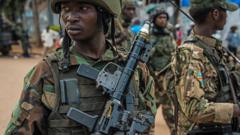As the conflict between Rwandan-backed M23 rebels and the Congolese government intensifies, China's attempts to maintain a neutral stance face significant challenges. The M23 rebels have recently seized control of vital cities in eastern Democratic Republic of Congo (DR Congo), prompting a shift in China's diplomatic posture. Historically, China has adhered to a policy of non-interference in African internal matters to protect its flourishing business investments across the continent. For instance, it has typically refrained from publicly criticizing African governments involved in conflicts, including across the Sahel region, where numerous coups have transpired since 2020.
However, the ongoing violence, particularly under the leadership of the M23 group claiming to represent the Tutsi minority alongside accusations against Rwanda for fueling unrest, has forced Beijing to reassess its approach. Until recently, China's official commentary on the conflict was limited to veiled criticisms of "foreign forces" supporting the rebels. Nevertheless, recent military advances by the M23 have led Chinese officials to explicitly call out Rwanda’s alleged involvement, marking a departure from its previous reticence.
This newfound criticism came to the forefront after notable military gains by the M23 since January, including key cities like Goma and Bukavu. China's UN ambassador called for Rwanda to cease its military support for the M23 and withdraw troops from DRC—an assertion that underscores Beijing's growing concern over stability in a region rich in valuable minerals. Despite this shift, experts note that China's statements remained relatively mild, lacking explicit condemnation.
Professor Zhou Yuyuan from the Shanghai Institutes for International Studies highlights that this adjustment in rhetoric may have been influenced by compelling evidence from UN reports detailing Rwanda's support for the M23. As global awareness of Rwanda's involvement rises, China may feel compelled to align its position with broader international consensus concerning the conflict's dynamics.
The strategic importance of DR Congo's mineral wealth is a clear driver behind China's evolving stance. With the eastern provinces, including North and South Kivu, serving as critical locations for gold mining and coltan—the latter being essential for a myriad of electronic devices—China has a significant vested interest in maintaining stability. Ongoing fighting poses direct risks to Chinese-operated mine operations, and the reduction or disruption of mineral supply could substantially impact China's economy.
Furthermore, China's broader involvement in DR Congo encompasses extensive investments in infrastructure, telecommunications, and energy projects—foundational elements of the Belt and Road Initiative. Relationships with both DR Congo and Rwanda are thus intricate, involving substantial economic ties that Beijing is determined to protect.
Both countries maintain strong diplomatic relations with China, with Rwanda's embassy in Beijing labeling ties as "excellent," indicating that the situation has not led to a notable diplomatic rift. China's extensive economic engagement, including loans for infrastructure projects and resource extraction endeavors, showcases its long-term interests in the region. This financial interdependence suggests a possible incentive for Beijing to advocate for a swift resolution to the ongoing conflict.
As the situation in DR Congo continues to evolve, the pressure is mounting on China to navigate its diplomatic balancing act effectively, especially as it contends with dual loyalties and complex geopolitical realities in its pursuit of resources and stability in Africa.

















